Intel Core i7 13700H
Rated: 8.5/10
AMD Ryzen 7 7735HS
Rated: 7/10
Pros And Cons
| CPU | Pros | Cons |
|---|---|---|
| Core i7 13700H | ✅ Better CPU Performance ✅ Larger L3 Cache | ❌ Older Manufacturing Node ❌ Higher Price |
| Ryzen 7 7735HS | ✅ Stronger Integrated Graphics ✅ More Modern Design | ❌Lesser Core Count ❌Older PCIE Version |
- In our testing, the Core i7 13700H shines with a remarkable 17.8% lead in single-core benchmarks, showcasing its superiority.
- For multi-core tasks, it impresses us further with a substantial 21.9% lead, making it a robust choice for multitasking and demanding workloads.
- The Ryzen 7 7735HS boasts an adaptable thermal design power (TDP) range of 35W to 54W, surpassing the Core i7 13700H’s 35W to 45W spectrum.
- Both processors support up to 64GB of memory, emphasizing their capability to handle our memory-intensive tested benchmarks effectively.
Comparison Table
| Key Specifications | Core i7 13700H | Ryzen 7 7735HS |
|---|---|---|
| Vendor | Intel | AMD |
| Release Date | January 3, 2023 | January 4, 2023 |
| Integrated GPU | Iris Xe Graphics (96EU) | Radeon 680M |
| Performance Cores | 6 | 8 |
| Performance Threads | 12 | 16 |
| Total Cores | 14 | 8 |
| Total Threads | 20 | 16 |
| L1 Cache | 80K (per core) | 64K (per core) |
| L2 Cache | 2MB (per core) | 512K (per core) |
| L3 Cache | 24MB (shared) | 16MB (shared) |
| Socket | BGA-1744 | FP7 |
| GPU Base Clock | 300 MHz | 2000 MHz |
| GPU Boost Clock | 1500 MHz | 2200 MHz |
| Execution Units | 96 | 12 |
Core i7 13700H Vs Ryzen 7 7735HS – Architectural Differences
- Process Node: While the Core i7 13700H utilizes a 10nm process node, the Ryzen 7 7735HS takes advantage of a more advanced 6nm process, potentially offering improved efficiency and thermal management.
- Clock Speed: Moreover, the Core i7 13700H boasts a Base Clock of 2.4 GHz and a rapid Boost Clock of 5 GHz, providing a balance of efficiency and performance, whereas the Ryzen 7 7735HS operates at a Base Clock of 3.2 GHz and a Boost Clock of 4.75 GHz, delivering a distinctive power profile.
- Memory Support Variation: Furthermore, with a shared capacity, both the Core i7 13700H and Ryzen 7 7735HS can accommodate up to 64GB of memory, but the underlying architectures may lead to varying memory management and access speeds.
- TDP: With a focus on thermal design power, the Core i7 13700H features a configurable range of 35-45W, while the Ryzen 7 7735HS provides a similar range of 35-54W, indicating potential differences in power consumption and thermal performance.
In the realm of high-performance computing, the clash between the Core i7 13700H Vs Ryzen 7 7735HS promises an intriguing duel. This article delves into the intricate specifications and rigorous performance benchmarks of these two processors, aiming to unravel which powerhouse emerges as the victor in the battle of silicon supremacy.
Performance Benchmarks
Moving from architectural grounds to practical performance, our scrutiny of these two processors across a set of benchmark software promises to shed light on their prowess. These performance benchmarks will reveal how the architectural disparities translate into the differences in computational speed, multitasking efficiency, and overall responsiveness.
Cinebench R23 (Single-Core)
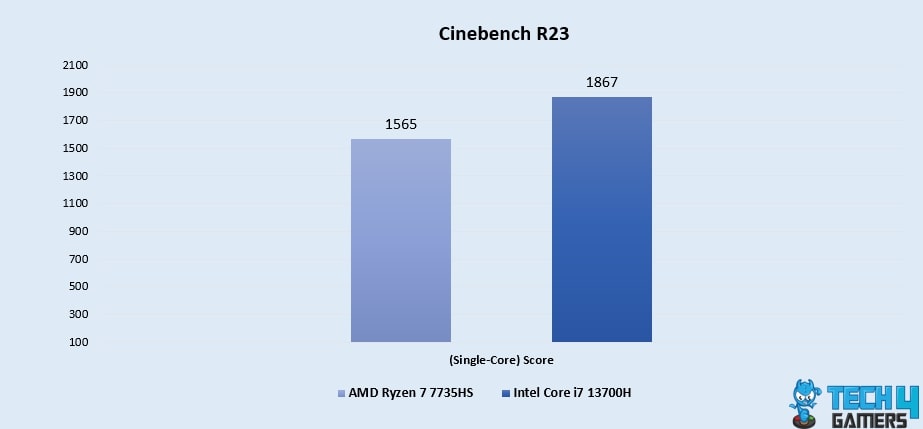
- Starting, we observed that the Core i7 13700H takes the lead with a notable 17.5% advantage, reaching a score of 1867, while the Ryzen 7 7735HS follows closely behind with a score of 1565, showcasing their single-core processing prowess.
Cinebench R23 (Multi-Core)
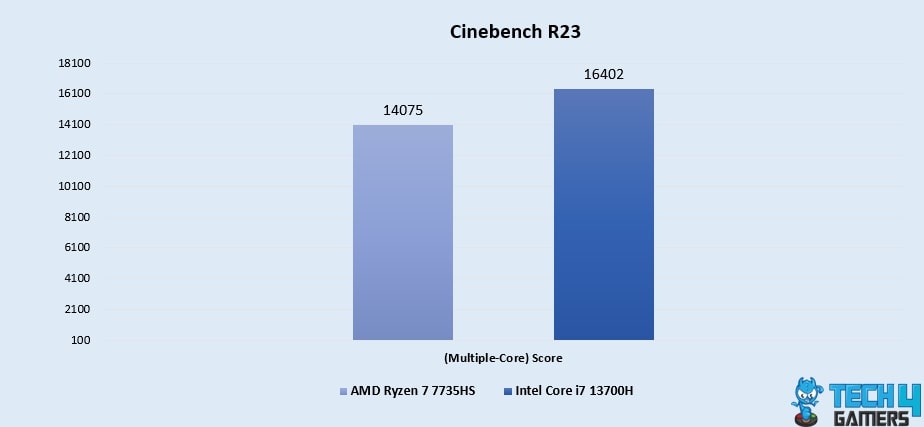
- Moreover, in multi-core performance, the Core i7 13700H maintains an 18.1% edge, achieving a score of 16402, while the Ryzen 7 7735HS delivers a solid performance with a score of 14075, highlighting their capabilities in handling multi-threaded workloads.
Geekbench 5 (Single-Core)
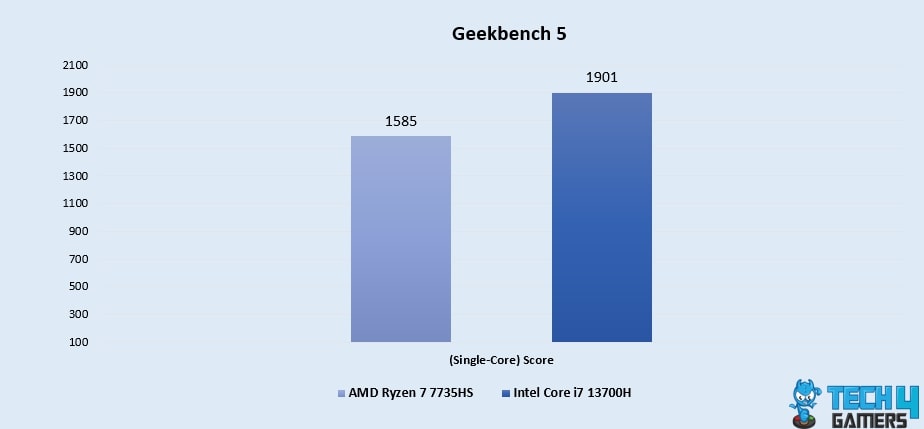
- In addition, the Core i7 13700H continues to exhibit its strength with a 15.2% advantage, achieving a score of 1901 in our tested single-core Geekbench 5 tests, whereas the Ryzen 7 7735HS demonstrates its single-core capabilities with a score of 1585.
Geekbench 5 (Multi-Core)
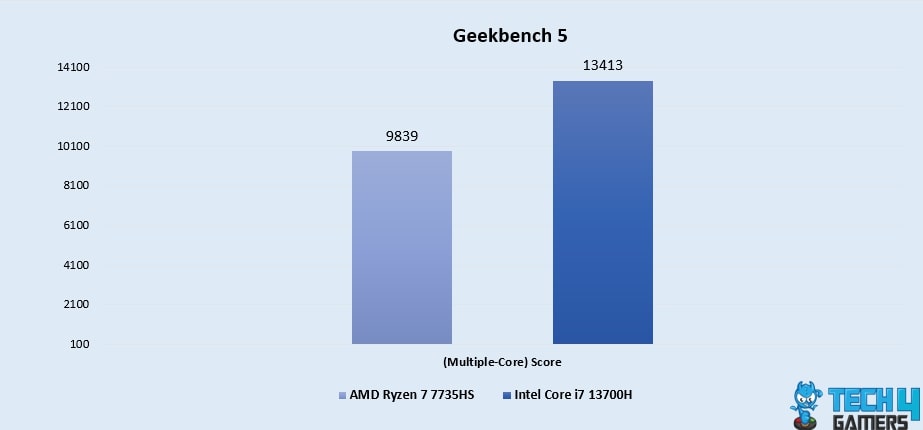
- Furthermore, with a significant 30.7% lead, the Core i7 13700H achieves a multi-core Geekbench 5 score of 13413, outperforming the Ryzen 7 7735HS, which delivers a score of 9839, showcasing their performance in various multi-threaded tasks.
Core i7 13700H Vs Ryzen 7 7735HS – Which Chip Should You Pick?
Intel Core i7 13700H: We discovered that the Core i7 13700H exhibits a significant 17.8% advantage in single-core benchmarks and a commendable 21.8% lead in multicore benchmarks, making it an appealing choice for us and users who prioritize swift and efficient processing in individual tasks and applications.
AMD Ryzen 7 7735HS: While both processors offer configurable TDPs, we consider the Ryzen 7 7735HS as it maintains a slightly broader range of 35-54W compared to the Core i7 13700H’s 35-45W. This variation allows users to balance performance and power efficiency.
Both chips support up to 64GB of memory, showcasing their memory-intensive capabilities. We reckon that the Core i7 13700H’s higher clock speeds might be advantageous for certain tasks, depending on your preference.
More From Intel Core i7 13700H:
Thank you! Please share your positive feedback. 🔋
How could we improve this post? Please Help us. 😔
[Comparisons Expert]
Shehryar Khan, a seasoned PC hardware expert, brings over three years of extensive experience and a deep passion for the world of technology. With a love for building PCs and a genuine enthusiasm for exploring the latest advancements in components, his expertise shines through his work and dedication towards this field. Currently, Shehryar is rocking a custom loop setup for his built.
Get In Touch: shehryar@tech4gamers.com


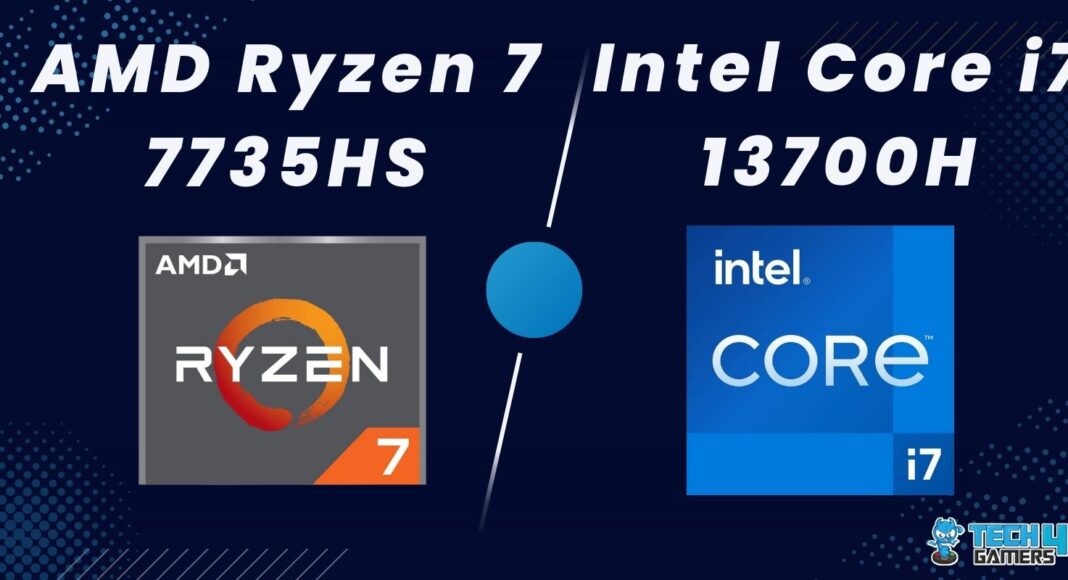
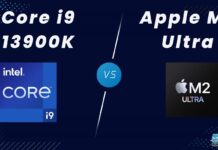
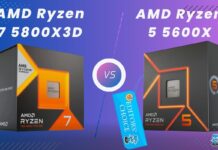
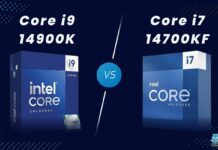
![Core i9-12900K vs Ryzen 7-5800X3D [We Tested 11 Games] Intel i9-12900K vs Ryzen 7-5800X3D](https://tech4gamers.com/wp-content/uploads/2022/06/Intel-i9-12900K-vs-Ryzen-7-5800X3D-218x150.jpg)
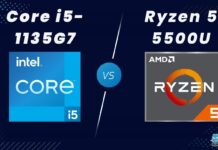
Feedback By: